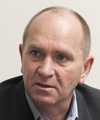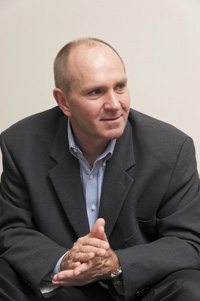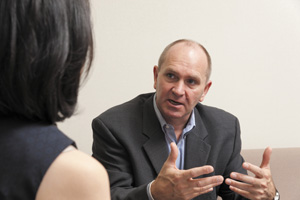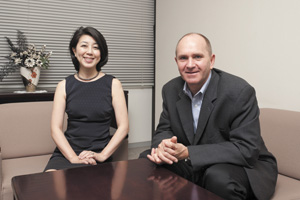 |
|
|
|
|
|
View from the Top Vol. 10, No. 9, pp. 1–4, Sept. 2012. https://doi.org/10.53829/ntr201209tp1  A Very Simple Strategy: Find Out Exactly What the Client Needs and How the Market Is ChangingOverviewFounded in 1983 in South Africa, Dimension Data is expanding worldwide as a comprehensive information technology (IT) solutions and services provider in the field of information and communications technology (ICT). Since joining forces with NTT in 2010, the company has been working to achieve an even higher level of performance. We sat down with Ettienne Reinecke, Chief Technology Officer, to learn about the growth strategy and future aspirations of Dimension Data in a volatile, changing market. Seeking a very simple but highly effective strategy—Mr. Reinecke, what has Dimension Data’s strategy been up to now? We have been moving forward by setting target markets while establishing very close communication channels with our clients. In this process, we have placed much importance on obtaining a thorough understanding of our clients’ businesses and the problems they face and on developing our business accordingly. The business environment has been undergoing major changes for more than ten years. The information and communications technology (ICT) industry has been maturing; clients have been seeking new business models; and macroeconomic movements, technical innovations, and business changes have been converging. These developments continue to impact the markets that we pursue and the strategies that we formulate. I believe that we too must change in line with these developments and that we must continue to evolve while keeping a watchful eye on key trends. At the risk of repeating myself, our mission is to respond to our clients’ needs. The efforts that we have made in creating maximum value have received high marks in client satisfaction measured by established research methods such as Gartner’s Magic Quadrant. —Your approach is to propose not what you want but what the client needs. How did you conceive of this approach? It is a very simple but extremely effective strategy. Our clients—many of which are financial institutions—are involved in a wide range of business activities with diverse business models. However, all of them are deeply concerned about cost. They share a common desire to expand business in the current market using advanced ICT and to consciously control cost. Two key requirements to this end are a high level of technical competence and a reduction in investment costs. Accordingly, if we cannot fully grasp what the client needs and values, it will not be easy to provide a solution that matches the client’s aspirations. For this reason, I believe that a sensational business can be developed if we can synchronize these key requirements with client goals. What we want to provide are solutions that clients who want to move their businesses forward have never experienced. Our sincere desire to have our client experience such solutions underlies this way of thinking. Though very simple in essence, this idea has led to truly effective results and has, as a consequence, given birth to very amicable, long-term relationships with our clients.
Sincere, long-term relationships—It appears that building long-term relationships is vital to Dimension Data for developing a robust, long-lasting business. Let’s look back at the business path that we have followed over the last 30 years or so. We started out as a very small-scale consulting company. At that time, even our clients realized that they were in the early days of applying information technology (IT) to expand business, but it was an era in which they would rack their brains trying to make sense of IT and figure out how best to use it. The history of our business therefore began with making proposals to clients who had a strong desire to use IT but did not understand how to use it to maximum effect. We then passed through various stages on our way to becoming a systems integrator. We began as a product integrator: in accordance with client needs, we proposed a set of appropriate products from diverse vendors. We then grew into a technology integrator: we gathered and analyzed a variety of new technologies and made proposals after assessing client needs. Now, as a systems integrator, our role is to understand and scrutinize ever-evolving ICT and provide our clients with optimal systems in a comprehensive manner. More recently, we have been presenting our clients with proposals that focus on service-oriented business models. All of our clients suffer from a severe lack of human resources and skills, as well as from strict demands placed on cost control. Needless to say, our clients and we too are being pressured in various ways by today’s worldwide, macroeconomic conditions. Regardless, the secret to achieving a robust, long-lasting business even under difficult conditions such as these is to continue with our efforts in understanding each client’s state of affairs and determining what services we should be providing. —What kind of insights have you had through your relationships with clients? As you know, we set sail on our quest to expand globally as a South African enterprise, and our first venture was in emerging markets, where efforts must begin with infrastructure building. I witnessed many struggles in trying to figure out how to go about building an infrastructure without adequate resources. But the times were changing with the coming of globalization, and we were determined to expand our business globally. But above and beyond our struggles, our clients found that they were entering an era in which they would be forced to globalize, and to support them in responding to that change, we ourselves had to change. That is, we had to find out what we should be doing to support our clients to overcome their IT challenges. While expanding our business in line with clients’ needs, we continued to learn. We started out by asking ourselves: “What does globalization mean in the first place?” We then reflected on what lessons could be learned from our globalization efforts and what our outlook for the future should be. Of course, we made many mistakes (bad choices), but by constantly revising our approach and learning from these mistakes, we arrived at our present state. In the end, I feel that there’s more to our business than just knowing about technology. It also means learning about actual business conditions and working on-site together with our clients in a truly participatory manner. In this way, we have been able to come up with many effective solutions. There are times when the market and industry find themselves at a crossroads, which is typically associated with some kind of groundbreaking event. I have seen how such a crossroads can stimulate innovation, and how the market and industry can undergo a sea change at such a time. In fact, I feel that we are entering a period of massive transformation right now. We can see this in cloud services: in the great changes that are taking place in the way cloud services are used and the volume of their use. We can also see it in the amazing advances that are taking place in mobile devices. A wave of great change is truly enveloping us all.
ICT is not the prime objective—it’s a tool. In the end, the focus should be on people.—As the market becomes borderless and development accelerates with such technological advances, how should we be making use of ICT? Life today is forcing people to strive for a work-life balance to survive a rapidly changing environment while coping with stress from work and other areas of life. Under these conditions, it is not enough to focus on only our own environment—we must also keep abreast of how society and the world at large are changing. That is, we must figure out how to ride this wave of change. This is indeed a very tough challenge for all of us. On the other hand, this wave helps to promote technical innovation, so figuring out how to use new technologies to our benefit is one way of surviving a very stressful environment. A good example of this is learning how to make good use of the cloud, tablet computers, smartphones, and other modern devices that are now becoming an integral part of our lives. In short, it’s not just about technology—it is also important that we apply our own knowledge or wisdom in coping with the situations that we face in our lives. Surviving this society is also very difficult for me, but I am making an effort to make good use of ICT to enrich my life. Whenever possible, I opt for a home-office work style that enables me to work and interact from home instead of having to go to the office. I am also concerned about managing my health and staying fit. For example, I’ve been making an effort during this stay in Japan to get into shape by running around the Imperial Palace whenever I can. I think it would be great if everyone could live a life that achieves such a balance, but there is also something that I want everyone to remember. Technological advances have certainly made remote communication easier, but fundamentally speaking, communication between remotely located people is based on trust created through direct, face-to-face communication. I often say to my colleagues and fellow employees that communication is something that happens between people while ICT is a tool for facilitating that process. This may seem obvious, but misunderstandings in this regard can easily occur. —Has this way of thinking penetrated the company? We communicate using all kinds of technologies. Because we are expanding our business globally, we make use of ICT to establish contact with any of our offices anywhere in the world. I have set up such facilities in my home so that I can communicate with others in the company as needed. At the same time, I fully understand the importance of face-to-face meetings, and I hold such meetings at least once every quarter. Using ICT for work-related communications is a given, but I also encourage others to use ICT to develop close relationships with colleagues inside the company and even with friends outside the company unrelated to work. Enjoying outside interests and cultural activities can help one to appreciate others and cultivate even better human relationships. I believe that this approach to life is essential to good teamwork in the workplace. —You talked about deepening one’s understanding about cultural differences, but Dimension Data and NTT have major differences in corporate structure and culture. Out of the many ICT-related companies in the world, why did you think of tying up with NTT? You might say that it’s in our DNA as a South African company to give culture a high level of importance. As you can probably imagine, Africa is filled with a great variety of distinctive cultures. Perhaps it is because of this environment that South Africans are open-minded about multiculturalism—they respect cultural differences. During our negotiations with NTT, differences between our corporate cultures did not present an obstacle. It took a little more than three years before a final decision was made, and during that time, we were able to develop an appreciation for each other’s way of thinking and build a relationship. This, I believe, turned out very well. At that time, we had also received offers from other companies, but none of them wanted to take the time to carefully develop mutual understanding. As you know, we are not a company that aims to create and provide something physical—what we do is provide services that our clients need. Accordingly, people who create services are the foundation of our business. And if these people—our staff—are not happy in their work, I think that it will be difficult to provide solid and compelling services. This idea is common to both Dimension Data and NTT, and this is why we joined forces. —Looking forward, what do Dimension Data and NTT aspire to achieve through this tie-up? Our relationship with NTT has so far given us access to R&D expertise and communication services that we previously did not have. I am convinced that we will be able to develop even stronger relationships with our clients against a background of NTT technologies as our role in this tie-up. Up to now, I have been focusing my efforts on three main areas: further expansion of cloud services, mobility, and playing a role in steering Dimension Data in the right direction. On looking at recent world trends, I feel that we, as an enlarged NTT Group, are well positioned to be successful in the changing business world. I believe that we can learn a lot from past experiences, and I would most certainly want to draw on these and do my best to understand the present––and provide some level of guidance for the future, within Dimension Data and the NTT Group.
Interviewee profileCareer highlightsEttienne Reinecke received the BSc. degree in engineering from Stellenbosch University and the BSc. (Hons) and M.E. (Masters) degrees in engineering from the University of Pretoria, South African Republic. He joined Dimension Data in 1991 and was appointed Chief Technology Officer in 1998. He heads the Group's new technology and research areas and provides leadership for its solution and services strategies. He is also Dimension Data's executive responsible for joint development initiatives with the NTT Group. In 1996, he was Managing Director of Omnilink (a startup company and Dimension Data subsidiary), which the Group merged with Internet Solutions in 1999. In the late 1990s, he was closely involved with the Group's globalization efforts. From 1998 to 2002, he sat on the Board of Dimension Data Holdings before joining the Group's Executive Committee. In 2011, he helped establish Dimension Data's Cloud Business Unit. For several years, he has played the dual roles of Chief Technology Officer and Group Executive for Network Integration. |



